by Wayne A. Pelly
In September I traveled to Kenya with Empower. Here is a report on the trip.
I appreciate everyone’s prayers, as well as those of you who felt led to provide some financial support. A lot goes into the success of a venture such as this. We’re tackling some deeply-rooted cultural practices, and it takes a combined effort to be successful.
My August letter began with the question, “Does Christianity really promote the equal worth of all people?” – and shared some of the ways certain interpretations of the Bible brought by missionaries inadvertently reinforced some harmful traditional beliefs within Africa (such as the belief that women have been cursed by God, based on a misunderstanding of Gen. 3:16, where God addresses Eve regarding their sin).
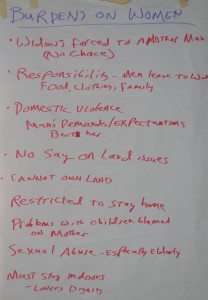
This is illustrated by the flipchart to the left – based on input from our African participants. We begin our seminars with small groups in which the participants discuss questions such as “What are the burdens on women in your culture” and, correspondingly, “What are the burdens on men?” Our African participants shared issues that women face in their culture that continue in spite of Christian influence. Traditional approaches to such concepts as “male headship” and female submission reinforce many of these practices.
I joined my African partners to facilitate three seminars using our New Man, New Woman, New Life material, helping participants through an understanding of creation, the impact of the fall on relationships (not just gender), and redemption as taught and practiced by Jesus Christ and the Apostle Paul. While we usually think of the sequence of “creation, fall and redemption” as addressing the issue of salvation from sin for eternal life, the focus in our seminars is on the redemption of the effects of sin for the life God intended to be reflected in our relationships here and now.
The reception was significant and the response was appreciative and powerful.
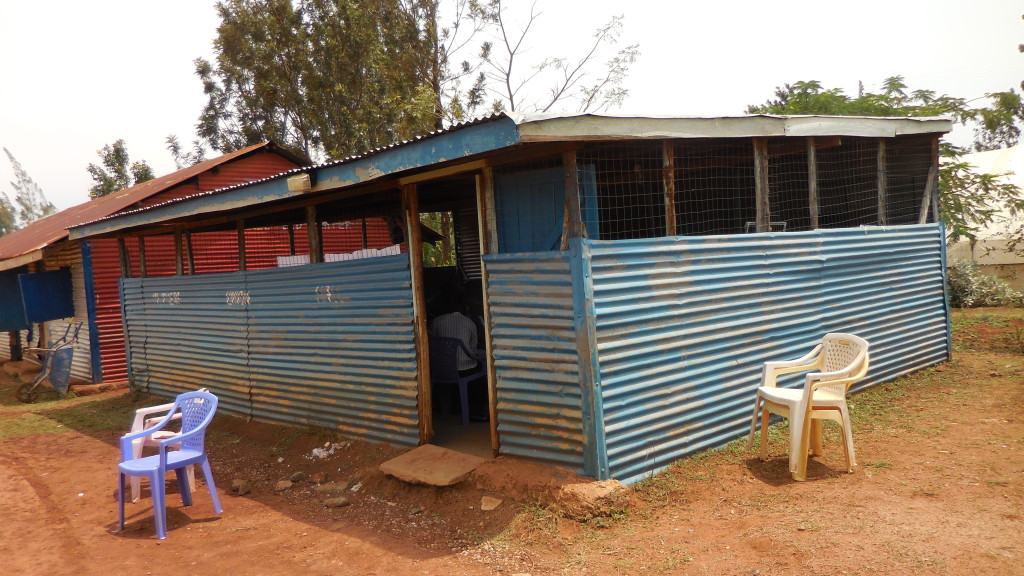
our Bondo Mothers’ Union seminar
Our first seminar was sponsored by the Mothers’ Union (a ministry of the Anglican Church) in Bondo, Kenya (a community of about 75,000 in the western part of the country, near Lake Victoria). This seminar was notable for its broad reach: participants came from nine different parishes.
While 30 is an optimal number for one of our seminars (four to five small groups of six to eight participants each day), Bondo drew over forty excited and involved participants. In addition, the bishop, Johannes Angela, made an appearance each of the three days, strongly indicating his support for the seminar. Although only a few husbands were able to attend, my friend and co-facilitator Paul Adhaya, an Anglican priest in the Bondo diocese, was commissioned by the bishop to follow up with the families involved. (One or more additional seminars will probably grow out of this.)
We utilize a small group approach to Bible study, in which the participants work through the lessons together. This is unusual for a “high power distance culture,” in which people expect to be told what the Bible teaches by a person in authority. (The idea that the Bible’s authority could lie in the Bible itself, and in the community as they study it together, is rather radical for them!) Men in particular report how
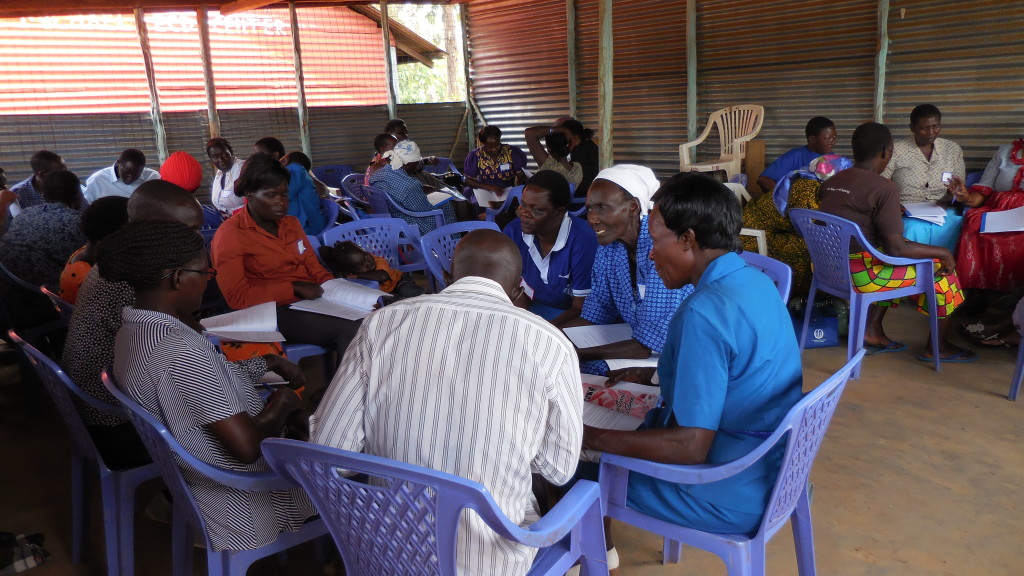
through the seminar Bible study together
this approach helps them to accept the significant paradigm shifts to which they are introduced. Representatives of each study group then report to the rest of the participants on their findings (each group works through a different lesson).
Following this seminar, I attended and spoke at the 2016 International Conference in Bondo sponsored by the Ekklesia (i.e., Church) Foundation for Gender Equality. My topic was “Genesis as the Basis for Gender Equality,” sharing the message of unity and equality in Genesis 1-2 and the impact of the Fall – the curse on the ground, resulting in scarcity – and its impact on relationships.
Following this week in Bondo, I traveled to Nairobi, the capital of Kenya, with Frank Tweheyo, our Africa Program Director, to conduct two seminars there. The first was in Utawala, in the east of Nairobi, at the Utawala Deliverance Church, an African Independent Church (AIC). (AICs are churches founded by Africans largely independent of Western denominations or missionaries. Our partners in Kenya are primarily various AICs and Anglicans – the Church of England, just the opposite of an AIC!)
Again, the seminar was well-received, with the attendance gradually growing each day as the word spread until we had over 40 (creating a bit of a challenge, since each day of the seminar builds on the previous). In addition, a broad range of area churches were represented.
One of these late-comers was James, who came the first time on the second day. He came again the third day and announced that he had not been born again (the typical way Africans distinguish between nominal and committed Christians) and after hearing the message the previous day, he wanted to make that commitment.
What is interesting is that on the second day, he had not learned about eternal salvation but about how Jesus challenged the patriarchy of his day. Jesus denounced retaliation, ethnic superiority, the desire for
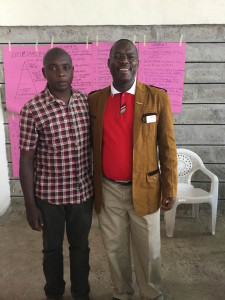
prominence and power and the resulting rivalry, as well as the objectifying of women. This is in addition to the ways in which Jesus challenged the cultural expectations of women (to provide sex, children and food for men) and enlisted them as disciples and proclaimers of his kingdom, which we also cover on the second day. He saw the impact of genuine conviction of real sin, and a clear vision of the way this life can be, if Jesus is really followed as Lord!
Another late arrival was Peter, the husband of Victoria, one of the receptionists at the hotel Frank and I were staying at. She noticed our name badges and correctly recognized we were with a conference or seminar of some sort. Upon learning about our ministry, she explained that she and her husband were leaders in their church’s couples ministry and this was an answer to prayer for good material. Peter was able to attend the later sessions of the seminar while Victoria worked at her day job.
Our final planned seminar fell through, as occasionally happens. This, however, was replaced by another seminar: One of our partners in Nairobi, Stephen Olang, Nairobi Director of Church Mobilization for International Justice Mission, was able to arrange a seminar for us with a group of pastors and church leaders in Kibera (reportedly the largest slum in Africa) southwest of central Nairobi. Meanwhile, Frank’s wife Phobice arrived from Uganda and was able to join us for this seminar (and assisted with facilitating, as she is an experienced Empower minister herself). She was familiar with Kibera, having done door-to-door evangelism there earlier in her ministry career.
It was on the first day at the Kibera seminar, during Frank’s
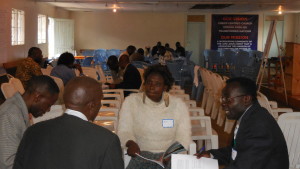
explanation of the implications of Gen. 2:24-25, and what it means to be one flesh, open and unashamed in marriage, that a pastor stood up and announced that he needed to repent – publicly – for hiding financial resources from his wife.
He had kept an account that he had never told her about and recognized that being “one flesh” meant finances should be “naked and unashamed” (Genesis 2:24) in their relationship as well.
Mary, a participant at the Kibera seminar, illustrated for us the importance of the work of Empower. When her husband died, they had only two daughters. Her lack of a son greatly jeopardized her standing with her deceased husband’s family, and she was eventually “chased away” (an expression we hear periodically).
While none of the other pastors and church leaders there agreed with the action of her husband’s family, they greatly appreciated the additional biblical tools with which to challenge this deeply rooted cultural practice.
On each Empower trip I always discover a new way to approach a topic and come away with new insight into understanding and presenting an aspect of the Scripture that is used in our seminars. In this case it was an approach to how “the husband is the head of his wife as Christ is the head of the church.” Of course, the key is that the husband is not head of his wife as the CEO is head of his corporation, or the general is head of his army – concepts as popular in Africa as they are among traditionalists in the U.S.
Our study guide highlights the passages in Ephesians that speak of Christ’s headship to the church, and I took one of them, Eph. 4:15-16, and using our standard low-tech flipchart, had the participants list the key words that occurred there. They discovered what the text says about the effect of Christ’s headship on the church: love (twice), growth (also twice), unity, maturity, each part doing its part, and then led a brainstorming session regarding practical ways husbands can facilitate these areas of growth in their wives, leading to a re-reading of Eph. 5:25-33, reinforcing the importance of husbands’ own love and sacrifice for their wives. We thus re-evaluated how they are to use the greater power that their culture gives them, and grew in an understanding of the transformation Paul was seeking in these passages (rather than using the passages, as so often happens, to reinforce harmful traditional practices).
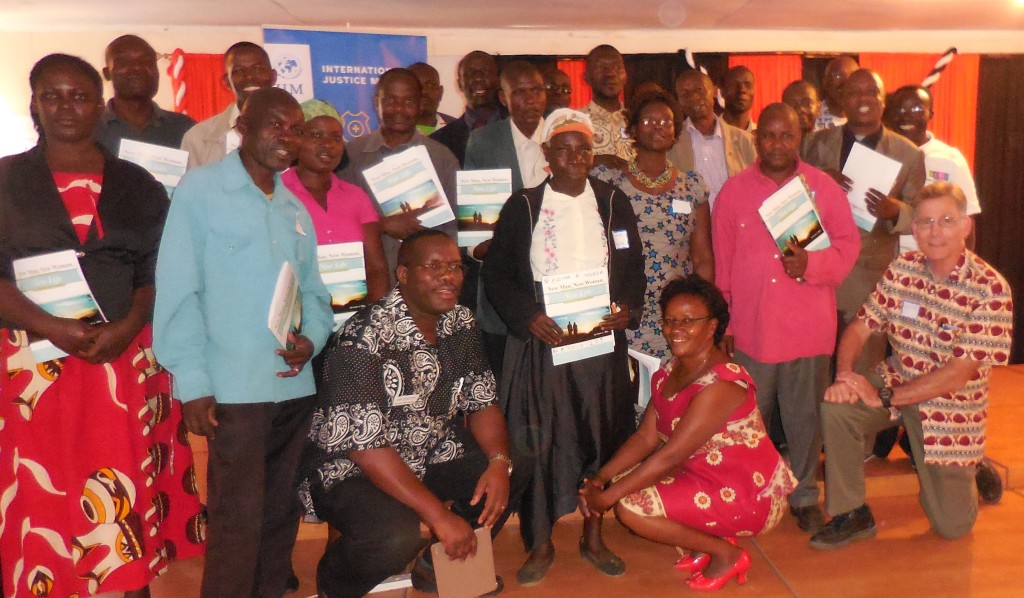
Finally, thank you for your interest in this vital ministry. For those of you who prayed, and those of you who gave: A special Thank You! You help to make this ministry possible and effective!
If you’d like more detail about my presentation, you can also find my “Genesis as the Basis of Gender Equality” PowerPoint slides [as a PDF] on our articles page (click here to access.)
